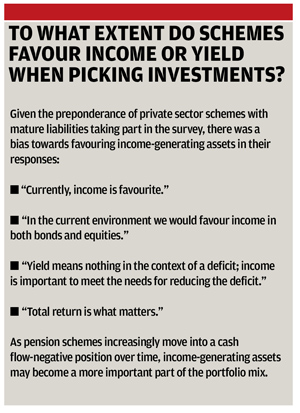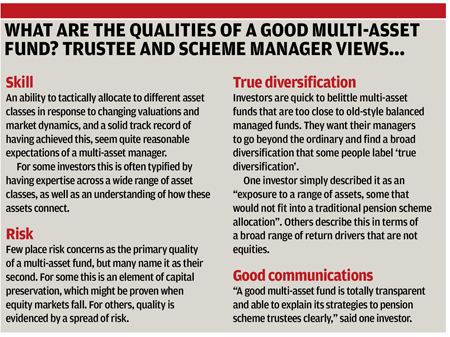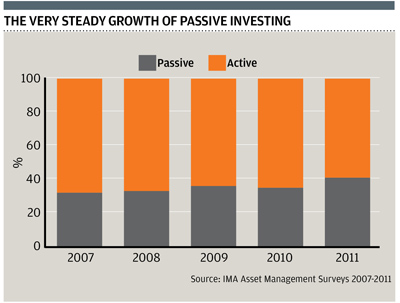Investment trends – an overview of approaches
Earlier this year, Pensions Week quizzed leading scheme managers, chief investment officers, trustees and consultants on investment beliefs. The findings were illuminating, occasionally contradictory, but all evident of how schemes are having to adapt to survive a tough economic environment. Here is a summary of the key pieces of feedback we received.
How good are pension schemes at decision-making?
For some, there was recognition that the train had already left the station.
There is the view that the decision by pension funds to invest heavily in equities and not to properly hedge their liabilities was a bad decision.
“There have been chances to invest in attractive opportunities or to hedge liability risks in the past few years. Most of these have not been taken.
“This has led to most pension funds being badly underfunded,” said Phil Page, client director at Cardano.
The chief investment officer of a multi-billion-pound defined benefit scheme said: “There will always be an issue where there is two-tier decision-making unless the trustees (or board) hands the decisions over to the someone at the investment coalface.
“The need for copious amounts of historic reporting absorbs precious resource. The size of funds is uneconomic.”
Though, there is optimism. “While many schemes have some way to go to improve their ‘reaction speed’, the direction of travel is clear and there are now a range of approaches available to trustees looking to build in a greater degree of responsiveness and dynamism into their strategy,” said Phil Edwards, principal at Mercer.
The survey found favour for small, specialised subcommittees that met regularly and were able to gather at short notice in events of crisis or opportunity – or at least schedule a teleconference.
“We usually advocate both a smaller investment committee with a mandate from the full trustee board to meet more often to discuss investment issues, as well as a separate, smaller working party able to meet either in person or via other means to make decisions on a week-to-week basis,” said Pete Drewienkiewicz, head of manager research at Redington.
Search for growth
The survey revealed a priority for assets that are able to provide attractive returns, with lower levels of risk and volatility.
“The credit crisis has made us consider the return, risk and liquidity of all potential investments very carefully,” said the investment director at a £4.2bn public sector scheme.
Consultants spoke of calling on schemes to assess assets based on their risk, reward and liquidity profile.
“We have been looking for opportunities to replace equities with a variety of asset classes we believe will offer similar or better investment returns with lower volatility,” said Drewienkiewicz.
Active vs passive
Supporters of active management claim current volatility creates the ideal scenario for a skillful fund manager to show their worth, while others argue it rarely justifies higher costs.
A member-nominated trustee at a £4.2bn scheme suggested active management is just a “marketing myth”, but a more tempered opinion came from the manager of a £1.4bn scheme. “Active management is only preferred if it is not closet index-tracking – ie must have a high tracking error – otherwise passive is more efficient on costs,” he said.
Such scepticism has led UK schemes to move from being 68 per cent invested in actively managed funds to 59 per cent in the past five years, according to the Investment Management Association. There has been a trend to wards ‘smart beta’ too.
“We intend paying more attention to smart beta rather than market cap-weighted passive investment,” said the investment director at a £4.2bn scheme, “but we have always had the overwhelming majority of our investments run on an active basis.”
Diversification
The majority of schemes taking part in this year’s survey said they were either a long way down the path or had completed their journey to reach a required asset mix. However, the investment consultants who also took part said many schemes had a naive view of diversification.
“You can kid yourself into thinking greater diversity automatically means less risk,” said Page at Cardano.
“If the majority of your investments are actually linked to common factors – that do well, or badly, in the same scenarios – then diversity may just lead to excessive complexity.”
Edwards at Mercer, says many of his clients now think about diversification across risk factors and return drivers, as well as by asset class.
“A discussion around the risk factors to which different asset classes are exposed can help provide a greater understanding of the nature of the risks within the investment strategy, and in particular highlight areas of concentration that might not be obvious when looking at asset class exposures alone.”
Most Viewed
- What does Labour have in store for the pensions industry?
- LGPS latest: GLIL backers invest £475m for UK infrastructure push
- Dashboard costs rose by 23% in 2023, figures show
- Border to Coast launches UK strategy in major private markets push
- How the pensions industry can better support people with mental health problems




